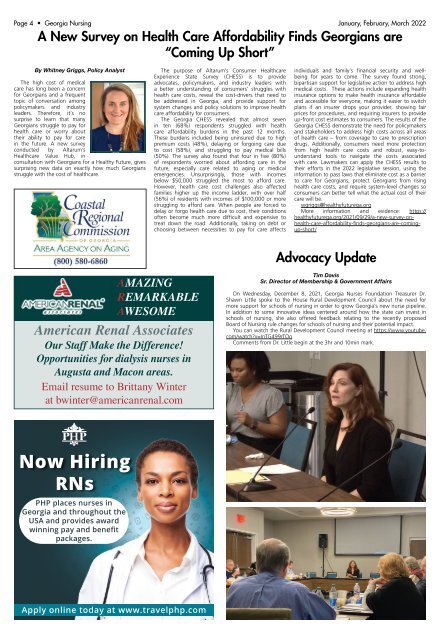Georgia Nursing January 2022
You also want an ePaper? Increase the reach of your titles
YUMPU automatically turns print PDFs into web optimized ePapers that Google loves.
Page 4 • <strong>Georgia</strong> <strong>Nursing</strong> <strong>January</strong>, February, March <strong>2022</strong><br />
A New Survey on Health Care Affordability Finds <strong>Georgia</strong>ns are<br />
“Coming Up Short”<br />
By Whitney Griggs, Policy Analyst<br />
The high cost of medical<br />
care has long been a concern<br />
for <strong>Georgia</strong>ns and a frequent<br />
topic of conversation among<br />
policymakers and industry<br />
leaders. Therefore, it’s no<br />
surprise to learn that many<br />
<strong>Georgia</strong>ns struggle to pay for<br />
health care or worry about<br />
their ability to pay for care<br />
in the future. A new survey<br />
conducted by Altarum’s<br />
Healthcare Value Hub, in<br />
consultation with <strong>Georgia</strong>ns for a Healthy Future, gives<br />
surprising new data on exactly how much <strong>Georgia</strong>ns<br />
struggle with the cost of healthcare.<br />
The purpose of Altarum’s Consumer Healthcare<br />
Experience State Survey (CHESS) is to provide<br />
advocates, policymakers, and industry leaders with<br />
a better understanding of consumers’ struggles with<br />
health care costs, reveal the cost-drivers that need to<br />
be addressed in <strong>Georgia</strong>, and provide support for<br />
system changes and policy solutions to improve health<br />
care affordability for consumers.<br />
The <strong>Georgia</strong> CHESS revealed that almost seven<br />
in ten (68%) respondents struggled with health<br />
care affordability burdens in the past 12 months.<br />
These burdens included being uninsured due to high<br />
premium costs (48%), delaying or forgoing care due<br />
to cost (58%), and struggling to pay medical bills<br />
(50%). The survey also found that four in five (80%)<br />
of respondents worried about affording care in the<br />
future, especially care related to aging or medical<br />
emergencies. Unsurprisingly, those with incomes<br />
below $50,000 struggled the most to afford care.<br />
However, health care cost challenges also affected<br />
families higher up the income ladder, with over half<br />
(56%) of residents with incomes of $100,000 or more<br />
struggling to afford care. When people are forced to<br />
delay or forgo health care due to cost, their conditions<br />
often become much more difficult and expensive to<br />
treat down the road. Additionally, taking on debt or<br />
choosing between necessities to pay for care affects<br />
individuals and family’s financial security and wellbeing<br />
for years to come. The survey found strong,<br />
bipartisan support for legislative action to address high<br />
medical costs. These actions include expanding health<br />
insurance options to make health insurance affordable<br />
and accessible for everyone, making it easier to switch<br />
plans if an insurer drops your provider, showing fair<br />
prices for procedures, and requiring insurers to provide<br />
up-front cost estimates to consumers. The results of the<br />
<strong>Georgia</strong> CHESS demonstrate the need for policymakers<br />
and stakeholders to address high costs across all areas<br />
of health care – from coverage to care to prescription<br />
drugs. Additionally, consumers need more protection<br />
from high health care costs and robust, easy-tounderstand<br />
tools to navigate the costs associated<br />
with care. Lawmakers can apply the CHESS results to<br />
their efforts in the <strong>2022</strong> legislative session, using the<br />
information to pass laws that eliminate cost as a barrier<br />
to care for <strong>Georgia</strong>ns, protect <strong>Georgia</strong>ns from rising<br />
health care costs, and require system-level changes so<br />
consumers can better tell what the actual cost of their<br />
care will be.<br />
wgriggs@healthyfuturega.org<br />
More information and evidence: https://<br />
healthyfuturega.org/2021/09/29/a-new-survey-onhealth-care-affordability-finds-georgians-are-comingup-short/<br />
Advocacy Update<br />
AMAZING<br />
REMARKABLE<br />
AWESOME<br />
American Renal Associates<br />
Our Staff Make the Difference!<br />
Opportunities for dialysis nurses in<br />
Augusta and Macon areas.<br />
Email resume to Brittany Winter<br />
at bwinter@americanrenal.com<br />
Tim Davis<br />
Sr. Director of Membership & Government Affairs<br />
On Wednesday, December 8, 2021, <strong>Georgia</strong> Nurses Foundation Treasurer Dr.<br />
Shawn Little spoke to the House Rural Development Council about the need for<br />
more support for schools of nursing in order to grow <strong>Georgia</strong>’s new nurse pipeline.<br />
In addition to some innovative ideas centered around how the state can invest in<br />
schools of nursing, she also offered feedback relating to the recently proposed<br />
Board of <strong>Nursing</strong> rule changes for schools of nursing and their potential impact.<br />
You can watch the Rural Development Council meeting at https://www.youtube.<br />
com/watch?v=InTG499rTOo<br />
Comments from Dr. Little begin at the 3hr and 10min mark.

















